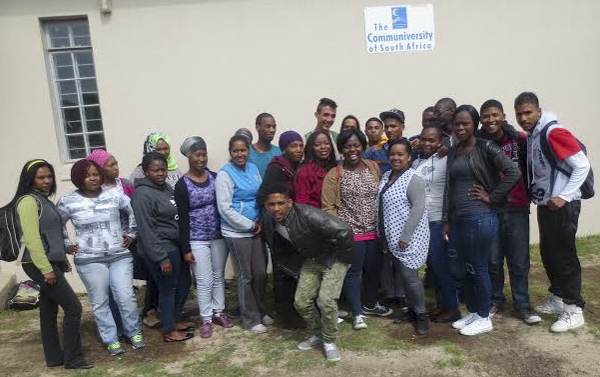Vrygrond’s Communiversity: offering young people a choice

Since the Communiversity opened its doors in Vrygrond in 2012, nearly 200 young people have graduated with new skills, ranging from maths to first aid and food gardening.
When GroundUp visited the centre last week it was busy with people flocking in to ask for brochures, to register for courses or to be assessed.
“Are you here for an assessment, ma’am?” asked one of the friendly staff members.
The students spoke with confidence and enthusiasm: clearly they were happy to be at the Communiversity.
The centre aims to offer practical education and training to “bright and deserving” people over 18 to help them integrate into the workforce. Priority is given to residents of Vrygrond and surrounding areas.
Students pay a R100 application fee and R600 for tuition - fully refunded upon graduation. Daily meals are provided.
The centre offers several programmes, including a programme in maths and English which is certified by the Independent Examinations Board, and a six month programme in which students are offered 12 courses designed to introduce them to various careers in preparation for employment, training or further education.
Courses aim to promote choice and self sufficiency and include: an introduction to health care, critical thinking, computer skills, English communication, food gardening, cooking and the hospitality industry, entrepreneurship and starting a business, maths literacy, introduction to creative arts, introduction to building, and a swimming and surfing course. At the end of this programme students can join a more focused mentoring programme in their chosen field.
Courses run from January to June and from July to December. Student numbers are small, with between 30 and 50 enrolments each half-year and up to 42 graduates. There are three full-time and nine part-time teachers.
Graduates have found jobs in a range of companies, from retail to restaurants, and in government.
The centre is funded by charitable foundations in the US and South Africa, and by the office of Patricia de Lille, Mayor of Cape Town.
Karen Julius, 19, has been at the centre for five months. “I am grateful to be here at Communiversity because I am empowered to speak with confidence. If I am going through struggles I get help to overcome them.”
She says she would like to study early childhood development when she graduates from the Communiversity.
“I feel encouraged when I see other students who graduated here being accepted in colleges and universities.”
Austin Pettersen, 17, dropped out of school in grade 9 and had not been in school for three and half years when he heard about the Communiversity from other young people.
“This is a good place to be. You are helped to find yourself as a person, unlike in other colleges which only care about money from their students. I used to smoke tik, but here they give me hope.”
“When I graduate here, I would like to give back to the community by coming back here to give motivational talks to new students.”
“I have told about six people from my former gang about the Communiversity. They said they are willing to come. Last week, I saw one of them coming for registration,” says Pettersen, who has a bursary to study panel beating and car respraying next year.

Zimbabwean student Tracey Mungofa, says she feels “at home”
at the Communiversity. Photo by Tariro Washinyira.
Zimbabwean student Tracey Mungofa, says management and students “are all friendly”.
“I feel at home, I only hear about xenophobic stories on television and from other community members, never here at Communiversity.”
“When I am going through stuff I am given a one-on-one counselling session. I do not have to make an appointment, I just pop in and the management leave anything they are doing just to help me. When I do not come to school, they call to check on me.”
“Before we start lessons daily, we are given 15 minutes to meditate so that we can put our mind at ease. I sit still, closing my eyes, and I am given a word to meditate on depending on my situation.”
She says she and other students have been on outings to historic sites and a nature reserve, and on overnight camps.
Mungofa heard about the project from another Zimbawean and left her shisa nyama job to join Communiversity. She says she wants to study drama when she graduates.
Many of the students had traumatic experiences before coming to the centre, says Priscilla David, director of education, who has been with the Communiversity for three years. Some did not have matric and “had no hope”, she says.
“The main criteria we use when we take them in are: do they want to make a difference, do they have the right attitude and good values.”
Most of the graduates are now studying further or have jobs.
David says the centre is “very strict on punctuality, attendance and attitudes”.
“Sometimes it is hard for students to adhere to this. These three things are important because when they finish here and acquire a degree they will still need these three things in order to achieve.”
Next: Masiphumelele will get a police station - when it’s safe
Previous: Blikkiesdorp families want to move again

This article is licensed under a Creative Commons Attribution-NoDerivatives 4.0 International License.


